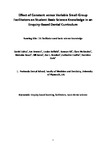Effect of Constant versus Variable Small-Group Facilitators on Student Basic Science Knowledge in an Enquiry-Based Dental Curriculum
| dc.contributor.author | Zahra, Daniel | |
| dc.contributor.author | Bennett, J | |
| dc.contributor.author | Belfield, Louise | |
| dc.contributor.author | Ali, Kamran | |
| dc.contributor.author | Mcilwaine, Clare | |
| dc.contributor.author | Bruce, M | |
| dc.contributor.author | Jones, G | |
| dc.contributor.author | Brookes, Zoe | |
| dc.contributor.author | Coelho, Catherine | |
| dc.contributor.author | Zaric, Svetislav | |
| dc.date.accessioned | 2019-06-28T09:10:10Z | |
| dc.date.issued | 2019-06-28 | |
| dc.identifier.issn | 1396-5883 | |
| dc.identifier.issn | 1600-0579 | |
| dc.identifier.uri | http://hdl.handle.net/10026.1/14481 | |
| dc.description | doi: 10.1111/eje.12451 | |
| dc.description.abstract |
Abstract Introduction The role of small-group facilitators is of pivotal importance for the success of curricula based on active learning. Disorganised tutorial processes and superficial study of the problem have been identified as main hindering factors for students? learning. The aim of this study was to evaluate the influence of consistency of facilitation on students? performance in knowledge-based, basic science assessments in a hybrid, enquiry-based (EBL) undergraduate dental curriculum. Materials and Methods This was a retrospective study of 519 year one and year two undergraduate dental students, enrolled at Peninsula Dental School between 2013 and 2018. Twice in each academic year, students sat a 60-item single-best-answer, multiple-choice examination. Percentage and Z-scores were compared between students whose EBL groups had the same facilitator throughout the academic year, and those whose EBL group was facilitated by different members of staff. All EBL facilitators were dentally qualified but with different levels of expertise in basic dental sciences, prior EBL facilitation, involvement in the curriculum design and university affiliation. Results No statistically significant difference was observed in the percentage or Z-scores of students whose EBL sessions were supported by consistent or variable facilitators in any of the 18 MCQ tests. Z-scores of year 1 students were more variable than for year 2 students. In addition, pairwise comparisons revealed no statistically significant differences in student Z-scores between any of the permanent facilitators? groups. Conclusions The results of our study may influence the design and delivery of enquiry-based curricula as well as human resources management by shifting the focus from maintaining facilitator consistency to ensuring comparable training and approaches across facilitators. This article is protected by copyright. All rights reserved. | |
| dc.format.extent | 448-454 | |
| dc.format.medium | Print-Electronic | |
| dc.language | en | |
| dc.language.iso | en | |
| dc.publisher | Wiley | |
| dc.subject | Enquiry-based learning | |
| dc.subject | facilitators | |
| dc.subject | basic dental science | |
| dc.title | Effect of Constant versus Variable Small-Group Facilitators on Student Basic Science Knowledge in an Enquiry-Based Dental Curriculum | |
| dc.type | journal-article | |
| dc.type | JOUR | |
| plymouth.author-url | https://doi.org/10.1111/eje.12451 | |
| plymouth.issue | ja | |
| plymouth.volume | 0 | |
| plymouth.publication-status | Published | |
| plymouth.journal | European Journal of Dental Education | |
| dc.identifier.doi | 10.1111/eje.12451 | |
| plymouth.organisational-group | /Plymouth | |
| plymouth.organisational-group | /Plymouth/Faculty of Health | |
| plymouth.organisational-group | /Plymouth/Faculty of Health/Peninsula Dental School | |
| plymouth.organisational-group | /Plymouth/Faculty of Health/Peninsula Medical School | |
| plymouth.organisational-group | /Plymouth/REF 2021 Researchers by UoA | |
| plymouth.organisational-group | /Plymouth/REF 2021 Researchers by UoA/UoA01 Clinical Medicine | |
| plymouth.organisational-group | /Plymouth/REF 2021 Researchers by UoA/UoA03 Allied Health Professions, Dentistry, Nursing and Pharmacy | |
| plymouth.organisational-group | /Plymouth/Research Groups | |
| plymouth.organisational-group | /Plymouth/Research Groups/Institute of Translational and Stratified Medicine (ITSMED) | |
| plymouth.organisational-group | /Plymouth/Research Groups/Institute of Translational and Stratified Medicine (ITSMED)/CBR | |
| plymouth.organisational-group | /Plymouth/Research Groups/Plymouth Institute of Health and Care Research (PIHR) | |
| plymouth.organisational-group | /Plymouth/Users by role | |
| plymouth.organisational-group | /Plymouth/Users by role/Academics | |
| dc.publisher.place | England | |
| dcterms.dateAccepted | 2019-06-24 | |
| dc.rights.embargodate | 2020-6-27 | |
| dc.identifier.eissn | 1600-0579 | |
| dc.rights.embargoperiod | Not known | |
| rioxxterms.versionofrecord | 10.1111/eje.12451 | |
| rioxxterms.licenseref.uri | http://www.rioxx.net/licenses/all-rights-reserved | |
| rioxxterms.licenseref.startdate | 2019-06-28 | |
| rioxxterms.type | Journal Article/Review |


